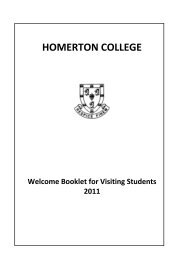The Newsletter of Homerton College, Cambridge & The Homerton Roll
The Newsletter of Homerton College, Cambridge & The Homerton Roll
The Newsletter of Homerton College, Cambridge & The Homerton Roll
Create successful ePaper yourself
Turn your PDF publications into a flip-book with our unique Google optimized e-Paper software.
Left and opposite page<br />
Phoebe Haines<br />
as Cassandra<br />
principal tool in distinguishing between<br />
the social standing <strong>of</strong> two characters<br />
is the difference between elevated<br />
verse and the more phlegmatic prose,<br />
Aeschylus formulates and subverts the<br />
spoken rhythm with a type <strong>of</strong> sensitivity<br />
more akin to that <strong>of</strong> a musical composer.<br />
I began by learning Cassandra’s spoken<br />
text, and was relieved to find that the<br />
musical rhythms <strong>of</strong> our original score (by<br />
composer and former Classics student,<br />
Alex Silverman) mirrored the spoken<br />
word with astounding accuracy. <strong>The</strong><br />
prescriptive rhythms inherent to the text<br />
meant that Alex had the delicate task<br />
<strong>of</strong> ascribing these rhythms accurately<br />
to the music <strong>of</strong> his original score. He<br />
used an octatonic mode throughout<br />
(as this is the closest musical scale we<br />
have to the modes <strong>of</strong> ancient Greece).<br />
As Cassandra is in a state <strong>of</strong> heightened<br />
emotion for her one, long scene in the<br />
play, she speaks in lyrical outpourings<br />
which lend themselves well to an<br />
operatic idiom. While there was musical<br />
underscoring used throughout the<br />
piece, the Cassandra scene was really<br />
the only example <strong>of</strong> solo singing in the<br />
piece. It was therefore essential that we<br />
acknowledged the expressive qualities<br />
<strong>of</strong> the sung passages, while ensuring<br />
that this scene didn’t jar stylistically<br />
with the rest <strong>of</strong> the piece. In both the<br />
rehearsal room, and onstage, this meant<br />
accruing a stamina that would allow me<br />
to act, sing, and move, while embodying<br />
and maintaining a sense <strong>of</strong> Cassandra’s<br />
hysterical despair.<br />
Helen Eastman’s direction combined the<br />
elements <strong>of</strong> the cerebral and visceral<br />
just as eloquently as Aeschylus’ text<br />
ties together the oppositional strands<br />
<strong>of</strong> omnipotent fate and personal<br />
indecision. We worked initially on the<br />
physicalisation <strong>of</strong> Cassandra, and then<br />
began to explore her mind-space and<br />
inner world. Greek drama tends to be<br />
typified by a fatalistic quality which<br />
perhaps does not take hold <strong>of</strong> a modern<br />
audience as powerfully as it would<br />
have done several thousand (or even<br />
hundred) years ago. However, I felt that<br />
it was important to allow Cassandra an<br />
individuality <strong>of</strong> thought which would<br />
permit the audience to believe in the<br />
originality <strong>of</strong> her situation, and the<br />
decisions she makes. My most essential<br />
task as an actor therefore was to assure<br />
the audience <strong>of</strong> her capacity for choice.<br />
This undoubtedly makes her short life<br />
and untimely end all the more tragic.<br />
Taking part in the Greek Play was<br />
unquestionably the most thrilling<br />
theatrical experience I have been<br />
involved in while at <strong>Cambridge</strong>. <strong>The</strong><br />
physical process <strong>of</strong> learning and<br />
performing the play was enormously<br />
challenging but infinitely rewarding. It<br />
is a tradition which should definitely be<br />
kept alive in <strong>Cambridge</strong>; Greek Drama<br />
is such a diverse, rich, and complex<br />
artform, and yet has the ability to reach<br />
out and grab hold <strong>of</strong> its audience with a<br />
unique vigour. If <strong>Cambridge</strong> University<br />
prides itself on both its historical and<br />
progressive elements, then there is truly<br />
no better emblem <strong>of</strong> this duality than the<br />
<strong>Cambridge</strong> Greek Play.<br />
Phoebe Haines<br />
Education with English and Drama<br />
2008 –2011<br />
<strong>Homerton</strong> <strong>College</strong> 11
















